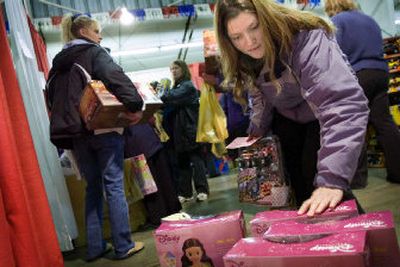Long lines reflect great need

When the Christmas Bureau opened for business Wednesday morning, the first person through the door at the Spokane County Fair and Expo Center was Need.
She wore an old winter coat with a broken zipper and clutched a child in her left hand. Folded together in her purse were her driver’s license, heating bill, and a medical coupon proving she mothered not just the boy at her side, but also three more children, all of whom needed toys for Christmas and a grocery voucher.
The second person was Need as well, as was the third, fourth and 400th. They all had different faces. They all waited outside in single-digit temperatures for something they couldn’t give themselves, a helping hand.
“We usually do all right,” said Delia Zavala, a 29-year-old mother of seven children from Hillyard. “It’s just this time of year when the heater’s on and you’re spending more.”
Right now Zavala’s husband, Randi Mitts, is between jobs. He’s a landscaper, who clears snow in the wintertime. Last week it looked like the couple would be on easy street as several inches of snow blanketed Spokane. But this week the skies cleared, temperatures dropped and Zavata’s furnace clicked on.
They still have Zavata’s cleaning job at North Central Care Center to pay the bills, but they sure could use some snow, she said. As she perused the toys laid out in the Agricultural building of the fairgrounds, Zavala marveled at the baby toys for her 1-year-old and the Bratz Girls accessories popular with the second- and third-grade girls. She left, an hour and 15 minutes after arriving, with a toy and a bag of candy for each child. Several hundred people waited for their turn as Zavala walked out the door.
“It’s always like this on the opening day,” said Bruce Butler, the bureau’s co-chairman. He spent the morning helping participants fill out the necessary paperwork. The detail that stood out in Butler’s mind three hours into the drive was the number of individuals living alone on less than $500 a month. He expected by nightfall to receive a crush of applicants from the income class known as the working poor, or people who remain in relative poverty despite working full time.
As the day unfolded, there were people who couldn’t get the amount of help they wanted because they lacked the paperwork needed to prove the number of kids they had or where they were living. A simple medical coupon was needed to prove the names and ages of dependents eligible for bureau help. A simple utility bill bearing the name and physical address of the applicant was enough to confirm residence. Bureau volunteers record such information in computers so it can be checked against anyone else applying from the same home or for the same dependants, the point being to spread bureau gifts and food vouchers as far as possible.
Butler encouraged applicants to submit the most current paperwork they had. There was no attempt to determine applicants’ true household income, though all were asked to provide an income estimate so the bureau could track who it was helping.
“Anybody who is willing to come in here and stand in line, we’ll take their word for it,” Butler said.
The line was the easy part for Shandi DeWolf, who drove 48 miles from Springdale, Wash., to the bureau with her 4-year-old son Ezekiel. In DeWolf’s case, Need looked like a 24-year-old mother with three children and a fourth on the way. She picked through the piles of children’s books for good stories then moved onto toys for her youngest kids.
Playing the keys of a tiny toy piano, DeWolf said, “I’m just looking for something that will make a lot of noise.” She picked up a snowboard for her 16-year-old brother, Billie, whom she and her husband, Adam, are raising.
Adam DeWolf works the green chain for Springdale Lumber. It’s hard work that involves pulling, sorting and stacking boards according to grade as they roll down a conveyor away from a screaming saw blade. The process is called a green chain because the boards are fresh and still moist.
Good work is hard to find in Springdale, where the newspaper classifieds are seldom longer than a couple of inches.
“If you don’t get a job there before it’s in the paper, then you don’t get the job,” Shandi DeWolf said.
Wednesday’s trip to the bureau wasn’t the first DeWolf has made. She used the charity a couple of years ago and tries hard to stay away unless she absolutely needs the help. This was the first year she was able to get to the bureau without carpooling.
“This is the first year I had a running car for Christmas,” she said.